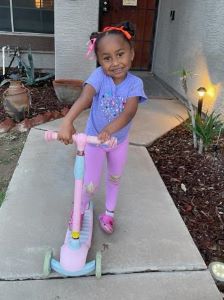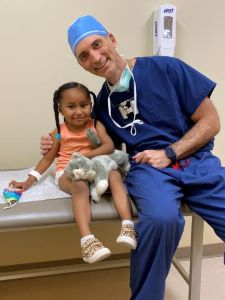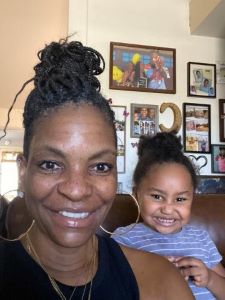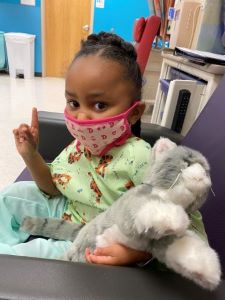
Scooters are popular among young children. They help develop gross and fine motor skills and enable kids to become more independent while opening doors to exploration, creativity and learning.
For 5-year-old Loni, born with amniotic band syndrome, scootering was a bit more difficult without a fully functioning thumb. Nevertheless, she longed to go faster and keep up with her friends.
Thanks to a toe-to-hand microsurgery performed by Timothy Schaub, MD, a hand, plastic and reconstructive surgeon at Phoenix Children’s Pediatric Hand Surgery and Congenital Program, Loni is zipping ahead with confidence and newfound independence.
Loni has undergone several procedures over the years to correct issues in her arms, hands and, most recently, her thumb at Phoenix Children’s. We are a national referral center for many children like Loni with hand trauma and abnormalities.
While few health systems offer expertise in this highly specialized area, our program boasts three of the nation’s top microsurgeons, including Dr. Schaub, Kareem Hassan, MD, and Kathryn King, MD.
Read on to learn about Loni’s remarkable journey.
Saving Loni’s arm from amputation

In 2018, Loni was born in Surprise, Ariz., with amniotic band syndrome (ABS), a spontaneous and not genetically linked condition that restricts blood flow and can result in stunted growth and amputation. ABS affects 1 in 5,000 to 1 in 10,000 live births.
“ABS is where stringlike bands of tissue from the amniotic sac get tangled around the baby in the womb,” said Tauralynn, Loni’s mom. “In Loni’s case, some of the fingers on her right hand didn’t fully grow in, and her left arm was detached completely.”
Shortly after birth, Loni was airlifted to Phoenix Children’s, where a surgical team reattached Loni’s left arm, restoring blood flow and some function.
Like many children born with ABS, this would be the first of many surgeries and treatments Loni would undergo at Phoenix Children’s.
“Treatment can be very different for every child,” said Dr. Schaub, one of Loni’s surgeons. “Some minor constrictions may not interfere with a child’s function, whereas others with tight constrictions like Loni’s may require many surgeries to increase blood flow and give a child back function.”
Loni’s journey to repair her hand
Tauralynn adopted her daughter Loni in 2019 at 8 months old. Tauralynn’s parents had fostered children in her teens, and the experience left a special place in her heart.
After working in corporate America for many years, Tauralynn knew she was ready to give out love to a child. But little prepared her for the beauty and love Loni would give back to Tauralynn and many others who met her.

Loni needed immediate surgery and follow-up care for ABS, so Tauralynn took her back to Phoenix Children’s to meet with the same team who had cared for her daughter as a newborn.
“Loni already had a team of people at Phoenix Children’s – many who already had a connection with her before I had even met Loni,” Tauralynn said. “From day one, I felt safe. I was a new parent but immediately felt like my daughter was seen.”
After some minor surgical repairs and treatments, Dr. Schaub and his team recommended that Loni undergo a toe-to-hand transfer at 3 years old. Toe-to-hand transfer is a complex microsurgery used to reconstruct the hand when fingers are missing. Dr. Schaub and his team would transfer a toe to act as a thumb for Loni.
“Toe-to-hand microsurgery is really a game changer for kids, and Loni was the perfect candidate,” said Dr. Schaub. “While the toe doesn’t look identical to a natural thumb, it bends the same way as a thumb and is a great option to restoring function in the hand.”
An opposable thumb is responsible for nearly half of a hand’s function. It can help with fine motor skills like buttoning a shirt and holding a pencil but also throwing a ball or riding a scooter.
Dr. Schaub recommended this surgery because studies show the brain connection and adaptation to limb replacements are significantly more successful at a younger age. Typically, the surgery is done between ages 2 to 5 years old, when children’s limbs are large enough to work with and children tend to be more compliant to care.
“I had never thought a surgery like this was possible, and the recovery seemed like it would be overwhelming, but Dr. Schaub told me children are much more resilient than we think they are,” Tauralynn said. “This journey required me to trust the Phoenix Children’s team, and I appreciate that Dr. Schaub listened to my concerns. It helped me manage my fears so I could help Loni manage her own.”
To help her daughter understand why she was going to have surgery, Tauralynn told Loni that Dr. Schaub would help her so she could ride her scooter faster. This worked. “Loni often refers to this when we talk about the experience,” Tauralynn said.
From pink casts to a pink scooter, Loni uses her new thumb in stride

Loni’s surgical transfer went well. She went home with two pink casts – one on her foot and one on her arm. Tauralynn said Dr. Schaub was right; Loni recovered beautifully and had fond memories from her experience.
“Loni likes to look at the photos and videos to help her in her recovery,” Tauralynn said. “She has no negative memories and feels empowered by the experience. Despite the pain and using a wheelchair, her spirits were never down.”
Loni is now in preschool and tells her teachers about her grip and building her strength. With the help of physical and occupational therapy, Loni can dress herself, go potty by herself, write, color, and, most importantly to Loni – ride her bright pink scooter. She likes to zip across the carport.
“She’s very adventurous, independent, spunky, smart and isn’t afraid of anything,” Tauralynn said. “She makes us laugh. We live a life full of laughter, and it helps us deal with hard things.”
As Loni grows, she’ll need monitoring to see if she needs any follow-up surgeries or tweaks. Earlier this year, Loni had some bulkiness taken out of the thumb to help give her more flexibility.
Tauralynn is focused on helping empower her daughter and is grateful that Loni had her Phoenix Children’s family to support and care for her as she grows.
“I’m teaching Loni to embrace her limb difference and look at obstacles as opportunities to problem solve throughout her life,” Tauralynn said. “Being supported by Phoenix Children’s gives me relief and helps to remind me that whatever challenges Loni faces, we will figure it out together.”
To learn more about the Hand Surgery and Congenital Hand Program at Phoenix Children’s, click here.
